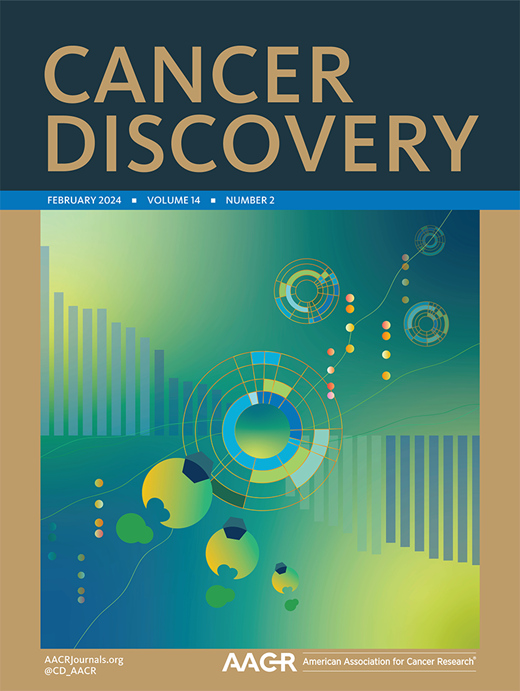NVL-655是一种选择性脑穿透抑制剂,可抑制多种ALK突变肿瘤蛋白,包括洛拉替尼耐药的化合物突变
IF 29.7
1区 医学
Q1 ONCOLOGY
引用次数: 0
摘要
目前已有三代酪氨酸激酶抑制剂(TKI)获批用于治疗无性淋巴瘤激酶(ALK)融合阳性的非小细胞肺癌。然而,没有一种药物能满足广泛耐药性、脑活性和避免临床剂量限制性TRK抑制的综合需求。NVL-655是一种合理设计的TKI,对96%的激酶组ALK具有50倍的选择性。在体外,NVL-655 可抑制多种 ALK 融合、激活性改变和耐药突变,与已批准的 ALK TKIs 相比,它对 ALKG1202R 单突变和复合突变的抑制效力提高了≥100 倍。在体内,它能诱导12种肿瘤模型的消退,包括颅内和患者来源的异种移植物。NVL-655 抑制 ALK 的选择性是 TRK 的 22 倍到 874 倍。这些临床前研究结果得到了正在进行的NVL-655首次人体I/II期试验的三项病例研究的支持,这些病例研究证明了NVL-655在ALK融合阳性非小细胞肺癌重度预处理患者(包括脑转移和单一或复合ALK耐药突变患者)中的初步概念验证临床活性。意义重大:NVL-655结合了针对单一和复合ALK耐药突变的广泛活性、脑穿透性和选择性,解决了目前已批准的ALK抑制剂的主要局限性,并有可能作为第四代抑制剂为ALK驱动的癌症患者带来显著的进步。本文章由计算机程序翻译,如有差异,请以英文原文为准。
NVL-655 Is a Selective and Brain-Penetrant Inhibitor of Diverse ALK-Mutant Oncoproteins, Including Lorlatinib-Resistant Compound Mutations
Three generations of tyrosine kinase inhibitors (TKI) have been approved for anaplastic lymphoma kinase (ALK) fusion–positive non–small cell lung cancer. However, none address the combined need for broad resistance coverage, brain activity, and avoidance of clinically dose-limiting TRK inhibition. NVL-655 is a rationally designed TKI with >50-fold selectivity for ALK over 96% of the kinome tested. In vitro, NVL-655 inhibits diverse ALK fusions, activating alterations, and resistance mutations, showing ≥100-fold improved potency against ALKG1202R single and compound mutations over approved ALK TKIs. In vivo, it induces regression across 12 tumor models, including intracranial and patient-derived xenografts. NVL-655 inhibits ALK over TRK with 22-fold to >874-fold selectivity. These preclinical findings are supported by three case studies from an ongoing first-in-human phase I/II trial of NVL-655 which demonstrate preliminary proof-of-concept clinical activity in heavily pretreated patients with ALK fusion–positive non–small cell lung cancer, including in patients with brain metastases and single or compound ALK resistance mutations. Significance: By combining broad activity against single and compound ALK resistance mutations, brain penetrance, and selectivity, NVL-655 addresses key limitations of currently approved ALK inhibitors and has the potential to represent a distinct advancement as a fourth-generation inhibitor for patients with ALK-driven cancers.
求助全文
通过发布文献求助,成功后即可免费获取论文全文。
去求助
来源期刊

Cancer discovery
ONCOLOGY-
CiteScore
22.90
自引率
1.40%
发文量
838
审稿时长
6-12 weeks
期刊介绍:
Cancer Discovery publishes high-impact, peer-reviewed articles detailing significant advances in both research and clinical trials. Serving as a premier cancer information resource, the journal also features Review Articles, Perspectives, Commentaries, News stories, and Research Watch summaries to keep readers abreast of the latest findings in the field. Covering a wide range of topics, from laboratory research to clinical trials and epidemiologic studies, Cancer Discovery spans the entire spectrum of cancer research and medicine.
 求助内容:
求助内容: 应助结果提醒方式:
应助结果提醒方式:


